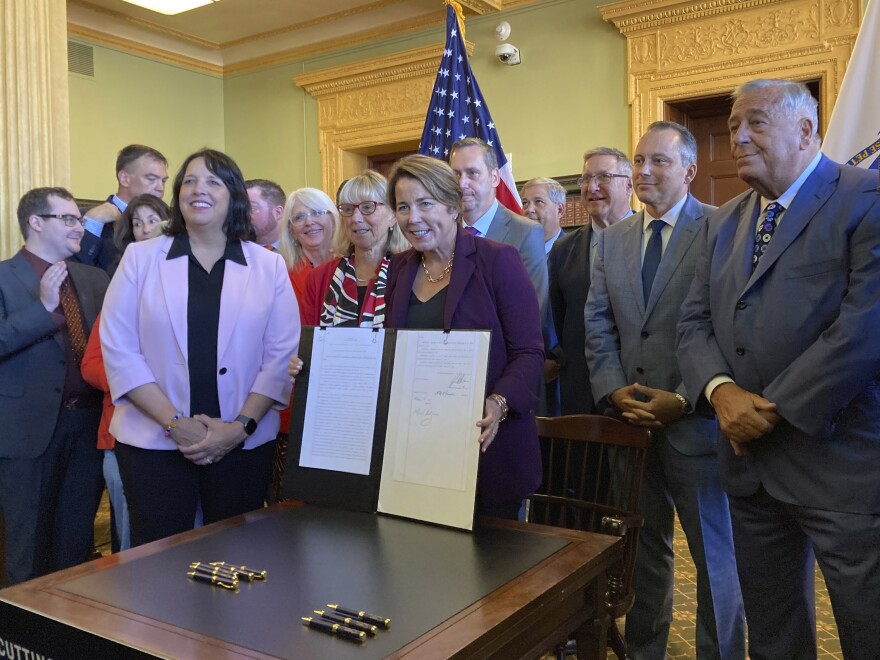Many Americans took a double whammy to the pocketbook this year: Prices for things like food and rent rose, and federal pandemic aid continued to peter out. But a string of states took a cue from one of those relief measures — the expanded federal child tax credit — and are stepping in to help bridge the gap.
That tax credit was a pandemic success story. Enacted in 2021, it cut child poverty in half before it expired at the end of that year, and poverty rates shot right back up.
Since then, the number of states that have created their own permanent child tax credit has doubled.
That's been a huge help for Ashley Andreas and her family in White River Junction, Vt. She and her partner were lucky enough to buy a house before prices skyrocketed, and both of them work. But it's still not easy with two kids and the high cost of child care.
"It's health insurance, it's vehicles breaking down," Andreas says. "You're always just kind of one accident away from draining your savings account and being in debt."
Andreas hadn't realized Vermont passed a new $1,000 child tax credit until the family got their tax refund this past April. "It was like, wow, this was so much more than we were expecting," she says.
The credit applies to children under 6, which includes Andreas' younger daughter. It was just in time. Andreas' partner got Lyme disease, which led to a slew of medical bills. And she says she was laid off this year; her new job is only part time.
She says $1,000 might not seem like much, but it can let them keep some extras for the kids that they'd hate to go without.
"It is, you know, a year's worth of gymnastics and ... quality holiday or summer camps that the kids can go to," Andreas says.
States that already had child tax credits expanded them in 2023
Vermont is one of 14 states that now have a child tax credit — 10 of them either created or expanded the benefit in 2023. Eleven states offer the full credit to families with the lowest or even no income.
Some state credits are available for immigrants, even those without legal status. Vermont made that change to help the migrant workers who are the backbone of its dairy industry. Other states peg the credit to inflation.
Kayla Kelechian is pleased that New York state just expanded its credit to include children under age 4. Her oldest child is 3, and she's expecting her second soon.
"We need a new stroller" to hold both of them, she says.
The credit is small, only $330, and New York lawmakers are talking about expanding it again. But Kelechian hopes even that amount can help her family "thrive instead of just survive." After the stroller, she imagines using the annual credit to "make that one extra payment, [or] I can put that in savings," or maybe enroll her son in an extracurricular activity.
State tax credits vary widely. Vermont offers the full amount to households making up to $125,000, with partial credit up to $175,000. And Minnesota sets a limit at households making less than $29,500 for single filers, or $35,000 for couples filing jointly. But its new credit is the country's largest: $1,750 for each child under 18.
Minister JaNaé Bates helped push for that. She's with the nonprofit Isaiah, which advocates for racial justice, and says the new benefit is sorely needed.
"The unemployment rate has dropped drastically, which is a great thing, but we also are seeing that more and more families have two or three jobs, where one job should be enough," she says, noting that in some cases both parents have multiple jobs.
Minnesota's governor predicts the new tax credit will cut child poverty by a third. And Bates says inspiration absolutely came from the sweeping financial aid during the pandemic, which allowed "people to have a little bit more imagination about what it means to care for each other."
Expanding these benefits in states has bipartisan support
In 2022, Congress tried and failed to revive its expanded child tax credit. Kevin Corinth, with the conservative American Enterprise Institute, says one concern among Republicans is that with a permanent credit, some parents would stop working.
"While the state-specific child tax credits are smaller than what we've seen at the federal level," Corinth says, "we still would likely see decreasing employment of parents, and that could offset some of the initial poverty decrease."
But that's been less of an issue at the state level, even if most states that have passed child tax credits are led by Democrats.
"Even in blue states, we're often seeing tax credits passing with bipartisan support," says Adam Ruben of the left-leaning Economic Security Project, which supports more such benefits.
One advocate in Maine told Ruben that the Republican committee chair likened expanding a tax credit to a tax cut. "And the advocate said, 'Yeah, it's a tax cut for working families.' And the Republican guy goes, 'Well, we're for tax cuts.' "
Now that more states have passed these measures, they are focused on getting the word out. Many families who qualify for new child tax credits may not make enough to pay any taxes, and so may not be used to filing a tax return.
The big push is to make sure they do — so people can claim these new benefits in 2024.
Copyright 2024 NPR. To see more, visit https://www.npr.org.



